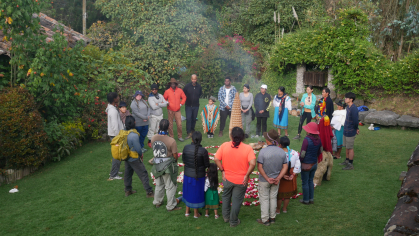In an era when those in power speak of racial justice but do little except turn a profit, the fight for change must move beyond rhetoric, author Roxane Gay told participants at the Global Racial Justice Summit, an event organized by student activists and held at Rutgers-Newark.
“For awhile now, when thinking about race, what I’ve really been thinking about is the wide gulf between words and action…How do we bring into alignment what we say, what we mean and what we do?” asked Gay, the Gloria Steinem Endowed Chair in Media, Culture and Feminist Studies at Rutgers. It was a question she posed throughout her keynote address.
The Rutgers Institute for the Study of Global Racial Justice, founded in 2020 with a $15 million grant from the Mellon Foundation, is a collaborative research hub for faculty whose work addresses racism and social inequality. Last year, it created the Fellows in Racial Justice Learning Community for undergraduate students, whose work was showcased at the event, held at Express Newark art and design center.
Themes of the summit were “Fighting for the Now, Hopeful for the Future” and “Education not Incarceration.” The emphasis was on racial justice efforts across three Rutgers campuses–Camden, Newark and New Brunswick–-including those that addressed inequities at the university.
Student work included advocacy efforts to increase higher education among the incarcerated and projects on colorism, educating undocumented students and increasing diversity at the Honors College in New Brunswick.
“So many people have so many amazing ideas and such a fire in them. All they need is the opportunity to do it,’’ said fourth-year student Cassandra Vega, a political science major who co-created the fellowship program as an undergraduate assistant to professor Carlos Decena in the institute’s Office of Undergraduate Intellectual Life.
Gay told students that when faced with racism, homophobia and threats to democracy, there’s no room for decorum. “For those who are marginalized, everything is at stake and we need to act like it. …Revolution isn’t about politeness. It’s supposed to be rowdy. You’re supposed to break s***. The result isn’t meant to be respectful.’’
She condemned the hypocrisy of corporations, especially in the wake of George Floyd’s murder in 2020, when there was an outpouring of symbolic gestures, anti-racist messaging and self-promotional funding efforts.
“Corporations said the right things, collectively they pledged about 50 billion to vaguely defined diversity initiatives, most of which would ultimately benefit those same corporations,’’ she said. “Around 70 million went directly to those doing social justice work and criminal justice reform. Nearly $4.2 million was in the form of actual grants, with range of payment terms from immediate to 10 years.’’
She added, “These corporations said Black lives matter. They meant, we recognize people are suffering and angry, and while we don’t really care, we are fine with doing the bare minimum to acknowledge that perhaps Black lives matter. And then they did very little, if anything at all.’’
Gay also decried gun violence and the political inaction that follows mass shootings, when lawmakers and senators fail to enact even mild reforms. “With a political class accustomed to doing nothing, the bare minimum is Herculean,’’ she said.
Some questions need to be answered for change to happen, said Gay. “How do we envision racial justice beyond the framework of white supremacy and what does racial justice look like when we decenter whiteness and center the voices of people of color, and especially Black people? How do we bring into alignment what we say, what we mean and what we do for the greater good?”
Gay urged student activists to be hopeful but persistent, acknowledging that while the future might look bleak, there has been progress. “It’s not 1904,’’ she said. “We have ways of talking about things that we didn’t have before.’’
She added, “We have to understand we can be hopeful, but we can also act.’’
During a panel discussion with Marta Esquillin, dean of the Honors Living-Learning College at Rutgers-Newark, and Vega, Gay said students need to work to register disenfranchised voters and reach those who are undecided. “But don’t try to reach the unreachable,’’ she said.
The summit’s first panel was on partnerships between prisons and universities and how to re-imagine higher education for the incarcerated. It was moderated by Samuel Quiles, who graduated from Rutgers-Newark this year and was enrolled in the NJStep program.
Panelists included Christopher Etienne, a Rutgers New Brunswick alumnus and NJStep graduate who now works at Princeton University, coordinating the STEM-OPS program to improve STEM education among the incarcerated. NJSTEP program staffer Baz Dreisinger, founder of the Prison-to-College Pipeline, and Eric Pereira, NJSTEP senior program coordinator, were also on the panel.
At the close of the summit, Michelle Stephens, founding and executive director of the institute, said the event, and all those involved, had more than fulfilled the mission of the fellowship program. “All of these people helped realize the dream of what does it mean for a research institute for racial justice to take seriously what students have to teach faculty.’’



